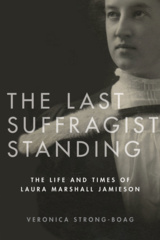
We Shall Persist
Women and the Vote in the Atlantic Provinces
Women in Atlantic Canada won the right to vote and to run for office only after long, vigorous, and exhausting campaigns for the Great Cause. We Shall Persist explores the distinctive political contexts and common problems faced by advocates for women’s suffrage and wider rights in the Maritime provinces and Newfoundland.
This regional suffrage movement was part of a web of human rights and social reform efforts that long predated the First World War. Despite virulent opposition in the press, the legislature, universities, churches, clubs, the home, and on the job, most nonindigenous women won enfranchisement shortly after the war. This victory curbed the most blatant political misogyny and prepared the way for more rights, including election to public office, minimum wage legislation, improved social assistance, and access to birth control. Yet sexism was not the only form of discrimination to be overcome. Heidi MacDonald critically and sensitively addresses inequities within the movement, including its disregard for Indigenous and African-descended women.
We Shall Persist captures both the long campaign and the years of disappointment. Suffrage victories across Atlantic Canada were steps in an unfinished and contentious march toward gender, race, and class equality.
This insightful book will appeal to readers with an interest in women’s history, as well as to historians, political scientists, and women’s studies scholars and students.
MacDonald has synthesized and condensed a remarkable amount of historiography and, especially, archival research into this slim book, while also doing justice to four separate provincial stories.
Heidi MacDonald is the author of numerous articles on women’s and gender history in Atlantic Canada. She is co-author, with Rosa Bruno-Jofré and Elizabeth Smyth, of Vatican II and Beyond: The Changing Mission and Identity of Canadian Women Religious. From 1999 to 2018, she taught at the University of Lethbridge and served as the founding director of the Centre of Oral History and Tradition from 2013 to 2017. In 2019, she became dean of arts and professor of history and politics at the University of New Brunswick Saint John.
Introduction
1 Suffrage Contexts and Challenges in the Maritimes and Newfoundland
2 Nova Scotia: Steady, Determined, and Strategic Agitation
3 New Brunswick: Early Promise, Sharp Opposition
4 Prince Edward Island: Informal but Consistent Interest
5 Newfoundland: Long and Fierce Opposition
6 The Legacy of Suffrage in Atlantic Canada
Conclusion
Sources and Further Reading; Photo Credits; Index








